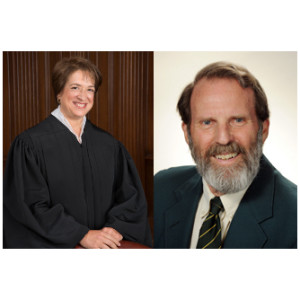Response by Dean Alan B. Morrison
Geo. Wash. L. Rev. Docket (Oct. Term 2014)
United States v. Wong, 575 U.S. ___ (2015)
Docket No. 13-1074; argued December 10, 2014; decided Apr 22, 2015
Slip Opinion | Oyez | SCOTUSblog
The question whether statutes that set time limits for suing the United States or its agencies under a variety of substantive laws has received quite a lot of attention in the Supreme Court since it ruled in Irwin v. Department of Veteran Affairs that the limit was not jurisdictional, but rather subject to equitable tolling in some circumstances.3 The case was notable because most prior decisions in suits for money damages against the federal government relied on the proposition that waivers of sovereign immunity should be strictly construed. That meant that there was no room for equitable tolling unless the statute expressly so provided. Irwin, as now construed in Wong, effectively reversed that understanding so that, like statutes of limitations involving private parties, equitable tolling is the rule, not the exception. The majority opinion, which was joined by Justices Anthony Kennedy, Ruth Bader Ginsburg, Stephen Breyer, and Sonia Sotomayor, also continued the trend of concluding that time limits were not “jurisdictional,” which means that they could be waived by the parties and did not have to be noticed by the court on its own.
The dissent of Justice Samuel Alito read the cases differently. In particular, he concluded that decisions under the Tucker Act, which provides for suits for money damages against the United States, provided the closest analogies. In those case, the Court had expressly held the statute to be jurisdictional. Justice Kagan, probably wisely, did not try to harmonize all the cases, but instead had a two word answer to the Tucker Act holding: “stare decisis.”4 In doing so, she cited the reason given by the Court in John R. Sand & Gravel Co. v. United States5 in re-affirming that the Tucker Act limitations are jurisdictional. Therefore, as a result of these recent decisions, including Wong, more parties will be able to bring claims, or more precisely, not lose claims against the United States, based on facts over which they have, in most cases, no control and the equities decidedly favor them.
It is always hard to know how much favorable facts affect a legal ruling like this, but if they have any impact at all, the facts of Wong strongly argued for rejecting the defense that the plaintiff had been too late in filing. The plaintiff’s claim was that she had been falsely imprisoned by INS agents, and she timely presented that administrative claim based on the FTCA to the INS within the two years allowed by law. The INS eventually denied her claim, which meant that she had to file suit within six months from that denial to be timely. But she had already filed suit against various INS officials on non-FTCA claims involving the same factual allegations. In addition, in anticipation of the denial of her FTCA claim by the INS, she moved the district court to amend her complaint to add the United States and her FTCA claim. The motion was referred to a magistrate judge who, within the six month period, recommended that the motion be granted, but the district judge, who had to pass on the motion, did not act until three weeks after the FTCA’s six month deadline. Thus, this is not a case where the United States lacked notice of a claim, and in fact the plaintiff was already in court on the same facts against the very employees of the INS whose conduct gave rise to both claims. In short, if notice had anything to do with this issue, the United States was fully informed well within the relevant time periods.
Nonetheless, the Government moved to dismiss the FTCA claim as untimely, which eventually led to the decision of the Ninth Circuit that the Court reviewed in these rulings. The lower court initially found that there was equitable tolling and eventually the Ninth Circuit agreed. Indeed, given the actual notice that the United States had of the basis of the FTCA complaint, both from the administrative claim and from the proposed amended complaint that was filed with the motion to amend, there was clearly no prejudice to the United States. One wonders why other than because it might have prevailed, the Government chose to try to get rid of one part of the case on limitations grounds, setting up a situation in which the legal rule came before the Supreme Court in about as unfavorable a factual setting as can be imagined. By contrast, the facts in the companion case on which equitable tolling was claimed was that the role of the federal agency in causing the harm to the plaintiff—the agency had allegedly concealed its approval of the installation of a highway barrier constructed by others, knowing it had not been properly crash tested6—raised a serious lack of notice issue to the federal agency that was not present in Wong. In addition, there were also non-federal defendants in June, and no court had concluded that the circumstances fell within the equitable tolling doctrine. Put another way, the facts in June, coupled with the argument that allowing a knowing concealment of wrongdoing to toll statutes of limitations would create an enormous loophole, would have made it a much better test case for the United States than was Wong.
As someone who has mainly represented plaintiffs in suits against the Government (although generally not in cases seeking money damages), the majority’s approach favoring equitable tolling in most cases seems more just than the dissent’s. Moreover, denying a limitations defense does not award plaintiff a victory, but simply allows the case to proceed to the merits. Either way, Congress could change the presumption generally or in some, but not all laws, but for now the message to the lower courts should be that equitable tolling, not strict jurisdictional rules, is the norm.
In addition to the Tucker Act’s jurisdictional limits, there is one other area in which time limits have been held to be jurisdictional: statutes providing for the time to take an appeal in the federal courts. The harshest case where this principle applied is Bowles v. Russell, where the district judge granted an extension to file an appeal, based on excusable neglect, but gave more days to do so than the rule allowed.7 The plaintiff’s lawyer filed within the time allowed by the court order, but the court of appeals on its own motion ruled that the appeal was untimely, and the Supreme Court affirmed. The decision was in large part based on the longstanding interpretation that times to file notices of appeals are jurisdictional, just like the Tucker Act cases, but no one has satisfactorily explained why the courts should care if the prevailing party below does not object, especially when the error results from following the order of a federal judge. In defense of a strict reading on time limits for appeals, Rule 4 of the Federal Rules of Appellate Procedure does include a number of specific exceptions, none of which applied in Bowles, although that is quite likely because no one envisioned that a judge-caused error would create a jurisdictional problem
It is probably expecting too much for Congress or the rule-writers to clean up the remaining areas where there is no equitable tolling, given everything else that is on their plates. But if the Justice Department wanted to live up to its name, it should refrain from raising the defense in cases like Wong, where the Government had all the notice it needed, and no purpose other than to deny a claimant her day in court would be served by finding that the limit is jurisdictional.
1. No. 13-1074, slip op. (U.S. Apr. 22, 2015).
2. No. 13-1075, slip op. (U.S. Apr. 22, 2015).
3. 498 U.S. 89 (1990).
4. Wong, slip op. at 13.
5. 552 U.S. 130, 139 (2008).
6. Id. at 13.
7. 551 U.S. 205 (2007)
Recommended Citation:
Alan B. Morrison, Response, United States v. Wong, Geo. Wash. L. Rev. Docket (April 23, 2015), http://www.gwlr.org/united-states-v-wong/.



